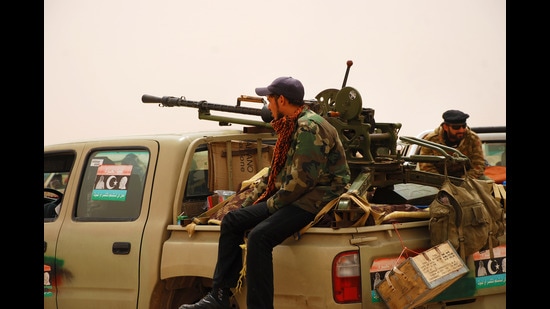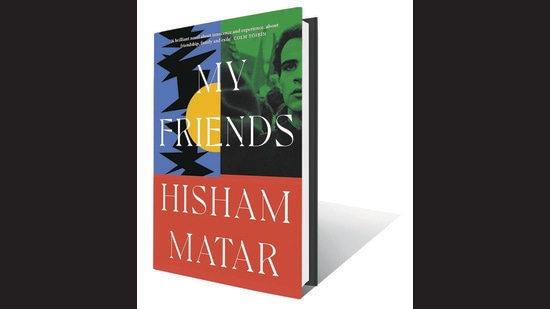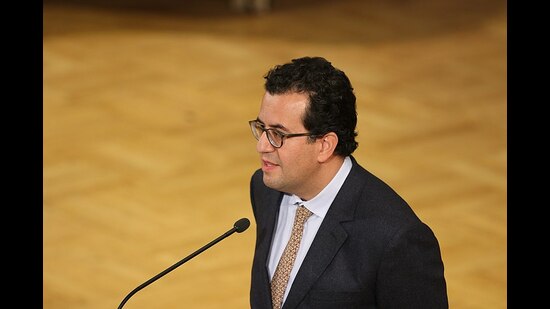Review: My Friends by Hisham Matar
The British-Libyan writer’s latest novel, which won the Orwell Prize for Political Fiction this year, leverages a real life event that occurred in 1984 to examine exile, friendship, love and memory
On 17 April 1984, an anti-Gaddafi demonstration was held outside the Libyan embassy in London’s St James’s Square in response to the situation back in the home country — persecution of dissenters, kidnappings and murders of artists, intellectuals, and students who protested against the dictatorial regime.

To avoid being recognised, protestors wore balaclavas. But their defiance and the presence of their exiled bodies outside the embassy posed a threat to the tyrant, who planned to retaliate. As the demonstration progressed, protestors found themselves in the middle of vengeful gunfire that injured 11 and killed a young police officer, Yvonne Fletcher.

Hisham Matar, the US-born British-Libyan writer of the multi-award-winning memoir The Return: Fathers, Sons and the Land in Between (2016), leverages this real-life event in My Friends, his latest novel, which recently won the prestigious Orwell Prize for Political Fiction. The chair of this year’s judging panel, literary critic Alexandra Harris noted that “Matar’s response to those gunshots is a richly sustained meditation on exile and friendship, love and distance, deepening with each page as layers of recollection and experience accrue.”
Reading My Friends reminded me of another Londoner, the painter David Hockney. While working on his most distinguished work, Portrait of an Artist (Pool with Two Figures), Hockney was faced with a “formal problem” — how to describe water? Its two-dimensionality posed a challenge. What water was to Hockney, time is to Matar. How do you keep time malleable in a book like this one where it possesses a solidifying presence (for example, events like the 1984 demonstration) but can also slip through your fingers, shapeless, like water (for example, the act of remembering).
Matar has tried to render character into memory in this novel of great feeling and extraordinary political awareness, which presents an unflinching portrayal of its characters, and chiefly its protagonist, Khaled Abd al Hady, who, over a “two-hour walk” in London, recollects the past as he revisits the places that altered the course of his life and helped cement friendships.
He was one of the student demonstrators. Coerced into participating by his friend Mustafa, he wore a balaclava and shouted slogans of liberty. He also naïvely felt that the “distinctions between those of us in the crowd fell away. I remember wanting to live more like this.” Of course, he lamented it later. But it isn’t the binary that one should feel concerned about here. It is breaking, as writer and poet Jerry Pinto calls it, the unique transformation that awaits young people as the world begins to explode, making it impossible for them to place themselves in the larger scheme of things.
It is useful to extend the idea of breaking to the desire of perpetually looking for a visible marker of familiarity — to belong. That’s what this exiled student was trying to do, rearranging his habits to fall in love with London, immersing himself in the beauty of words, language, and literature, trying his best to maintain familial relationships fractured by distance and corrupted by lies. The parts where Khaled converses with his family over the phone and when they, after years, come to meet him are heartrending; precious almost.
All of it actually translates to alienation, aloneness, and placelessness.
To help bear these unfathomable feelings, the individual makes friends. And friends rarely leave your life unaltered. More so if it is a “friendship [that] had become a replica of what it had once been when he lived here and we shared the city the way honest labourers share tools”; like Khaled did with the “he” here, writer Hosam Zowa, who influenced him and earned a special place in his heart.
Khaled learned about Hosam (who was six years his senior) from a news bulletin their family was listening to at the former’s home in Benghazi. The Libyan journalist with the BBC Arabic Service, Mohammed Mustafa Ramadan, was reading a piece of fiction by Hosam, The Given and the Taken, instead of news that day. He reasoned to his listeners that “at times, a work of the imagination is more pertinent than facts.” The journalist was, of course, murdered on the orders of Colonel Qaddafi — “the kernel of our grief”, as Hosam calls him. Mustafa Ramadan’s assassination is another real-life event that Matar weaves into this narrative, giving it the flavour of a memoir. The fictionalisation actually makes it more effective. The telling of facts makes My Friends as much a human geographical account of the exiled as it is a tale of memory, friendship, and love.
Some of Matar’s writerly manoeuvres are more deliberate than they appear. They inject an ease into his prose and underline his mastery of the craft. Take his purposeful, multiple usage of select words, such as “confederacy” and the use of the extended metaphor of “translation”. Then, anyone who has witnessed emotional violence of a scale that makes them want to erase themselves, cannot escape disturbing dreams. Matar deftly employs these throughout the narrative. Often their interpretations are both baffling and charming. Additionally, the novelist Joseph Conrad makes multiple appearances in My Friends like he didin Matar’s memoir, The Return. How Matar pulls it off is quite marvellous.
But there’s one more connection between The Return and My Friends.On page 113 of My Friends, Khaled receives a letter from his friend Rana, who had called every hospital to check where he was admitted after being injured at the demonstration. She writes: “But, seriously, one minute you tell me, Rana, let’s cure ourselves of our countries (‘cure’: that was the word you used), then the next thing I know you are laying your life on the line for yours.”

And here’s an extract from The Return: “Surely such journeys were reckless. This one could rob me of a skill that I have worked hard to cultivate: how to live away from places and people I love. Joseph Brodsky was right. So were Nabokov and Conrad. They were artists who never returned. Each had tried, in his own way, to cure himself of his country.” (Emphasis mine.)
Writers or people in general might want to cure themselves of their countries or their pasts. But two things are certain. One is what Khaled notes in the book: it would be “foolish to think we are free of history as it would be of gravity”. The other is what Ismail Kadare, whose works “obeyed only the laws of literature” once said: “Art is neither unhappy nor happy under a regime.” My Friends is an ode to these certainties. It is a letter filled with injury, pain, love, and, most importantly, hope for language and literature.
Saurabh Sharma is a Delhi-based writer and freelance journalist. They can be found on Instagram/X: @writerly_life.






